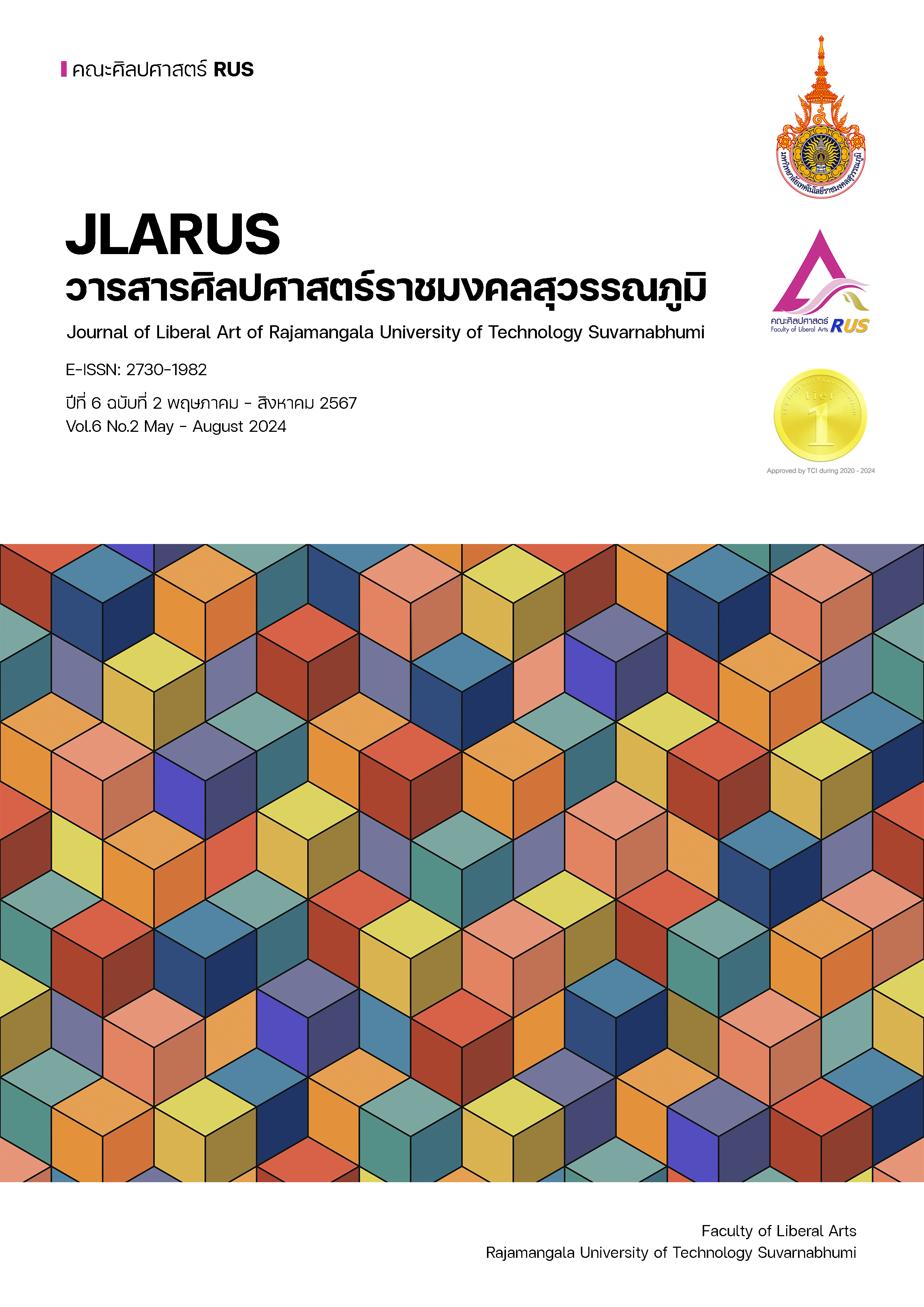DEVELOPMENT OF INNOVATIVE TRAINING COURSES FOR MODERN MUSHROOM FARM ENTERPRISES BASED ON DESIGN THINKING PROCESS
Main Article Content
Abstract
The objectives of this research were: 1) to develop an innovative learning training course by using the Design Thinking process for modern mushroom farm operators, 2) to lead an innovative learning training course by using the Design Thinking process for farm operators, and 3) to evaluate and improve the innovative training curriculum by using the Design Thinking process for modern mushroom farm operators. In-depth interviews, small group discussion, and training were conducted. There were 17 key informants and 30 training participants. The research was qualitative data analysis, which consisted of: content analysis based on document research by interpreting and formulating inductive conclusions, data triangulation both theoretical and data-driven components, and utilization of high-quality data analysis methodologies (QDAT Knowledge; 6'C).
The results of the research findings were: 1) curriculum development must be appropriate and could be actualized with principles and management concepts. This was advantageous to farm development for modern entrepreneurs and drafting an innovative learning training course by using the Design Thinking process for modern mushroom farm operators with seven main elements: 1) principles and reasons, 2) objectives of the course, 3) principles of the course, 4) content structure, curriculum 5) training activities 6) media and learning resources, and 7) measurement and evaluation. 2) The competency of the trainees was at a high level. The participants had an aggregate training process score of 378.17, accounting for 80.46 percent. The course created by the researcher had the efficiency process, and the results of the training course were effective (E1/E2) equal to 80.46/80.11, passing the criteria. 80/80, and the participants were satisfied with the comprehensive training course at a high level. 3) The results of the evaluation of the use of the training course had the overall average level at the highest level.
Article Details

This work is licensed under a Creative Commons Attribution-NonCommercial-NoDerivatives 4.0 International License.
References
ใจทิพย์ เชื้อรัตนพงษ์. (2539). การพัฒนาหลักสูตร: หลักการและแนวปฏิบัติ. กรุงเทพมหานคร: อลีน เพรส.
ชินวรณ์ บุณยเกียรติ. (2555). การเตรียมความพร้อมของไทยเพื่อก้าวสู่ประชาคมอาเซียน ปี พ.ศ.2558. กรุงเทพมหานคร: ห้างหุ้นส่วนจำกัดเปเปอร์เฮาส์.
ทับทิมทอง กอบัวแก้ว, เกริกเกียรติ กอบัวแก้ว และสมเกียรติ กอบัวแก้ว. (2566). รูปแบบการจัดการเรียนรู้แบบไฮบริดที่เสริมสร้างสมรรถนะด้านการพัฒนาสื่อนวัตกรรมการเรียนรู้ของนักศึกษาวิชาชีพครู. วารสารวิชาการ ครุศาสตร์สวนสุนันทา, 7(1), 1-13.
นภัทร์ แก้วนาค. (2555). เทคนิคการวิเคราะห์ข้อมูล (Qualitative Data Analysis Technic). เอกสารประกอบการสอนหลักสูตรการวิจัยและพัฒนาหลักสูตร. กรุงเทพมหานคร: มหาวิทยาลัยศรีนครินทรวิโรฒประสานมิตร.
นุชจรี กิจวรรณ. (2561). กระบวนการคิดเชิงออกแบบ: มุมมองใหม่ของระบบสุขภาพไทย. วารสารสภาการพยาบาล, 33(1), 5-14.
พิสณุ ฟองศรี. (2550). การประเมินทางการศึกษา: แนวคิดสู่การปฏิบัติ. กรุงเทพมหานคร: พรอพเพอร์ตี้พริ้นท์ จํากัด.
วิชชาพรรณ กิ่งวัชระพงศ์, ชนะ กสิภาร์, สมยศ เจตน์เจริญรักษ์ และศิริพรรณ ชุมนุม. (2554). รูปแบบการพัฒนาหลักสูตรฐานสมรรถนะ ด้านการโรงแรมและบริการ งานบริการส่วนหน้า ตามมาตรฐานอาชีพอุตสาหกรรมการโรงแรม. วารสารวิชาการพระจอมเกล้าพระนครเหนือ, 21(2), 377-386.
ศิวะลักษณ์ มหาชัย และเอกราช โฆษิตพิมานเวช. (2565). การพัฒนาหลักสูตรสถานศึกษา. วารสารมณีเชษฐาราม วัดจอมมณี, 5(2), 168-185.
สงัด อุทรานันท์. (2552). พื้นฐานและหลักการพัฒนาหลักสูตร. กรุงเทพมหานคร: จุฬาลงกรณ์มหาวิทยาลัย.
เสนาะ ติเยาว์. (2543). การบริหารงานบุคคล. กรุงเทพมหานคร: มหาวิทยาลัยธรรมศาสตร์
เส้นทางเศรษฐีออนไลน์. (2567). “กระท่อมเห็ด ฟาร์ม” จากศูนย์เรียนรู้และแหล่งท่องเที่ยวเชิงเกษตร สู่การยกระดับและสร้างมูลค่าเพิ่ม. สืบค้น 30 มีนาคม 2567. จาก https://www. sentangsedtee.com/job-is-money/article_260922.
สุกิจ ชัยมุสิก, เสนีย์ คําสุข และอารดา ฉิมมากูร. (2564). กระบวนทัศน์การพัฒนาหลักสูตรรัฐศาสตร์ ที่พึงประสงค์ในบริบทสังคมไทยยุคดิจิทัล. วารสารพุทธมัคค์, 6(2), 64-76.
สุมัยย๊ะ สาแอ. (2565). การพัฒนานวัตกรรมการเรียนรู้โดยใช้ปัญหาเป็นฐานร่วมกับวิทยาการหุ่นยนต์เพื่อส่งเสริมทักษะการคิดเชิงคำนวณ รายวิชาวิทยาการคำนวณ สำหรับนักเรียนชั้นมัธยมศึกษาปีที่ 1 (วิทยานิพนธ์). ยะลา: มหาวิทยาลัยราชภัฏยะลา.
สมศักดิ์ วาทินชัย. (2566). การบริหารจััดการธุุรกิจสตาร์ทอััพให้ประสบผลสำเร็จ. รัฏฐาภิรักษ์, 65(2), 119-132.
อัฐวุฒิ จ่างวิทยา. (2561). วิวัฒนาการของการคิดเชิงออกแบบ: จากกลยุทธการแก้ไข้ปัญหาของภาคธุรกิจ สู่องค์ความรู้ในภาควิชาการ และการไปสู่การย่อส่วนเพื่อนำไปปฏิบัติจริงในพื้นที่. วารสารวิชาการ Veridian E – Journal, Silpakorn University, 11(3), 1944–1957.
Abdullah, S., Musa, C, & Azis, M. (2017). The effect of organization culture on entrepreneurship characteristics and competitive advantage of small and medium catering enterprises in Makassar. International Review of Management and Marketing, 7(2), 409-414.
DESIGN THINKING AT MARRIOTT. (2017). Retrieved Oct 1, 2023, from https://www. seasiacenter.com/insights/blog/design-thinking-at-marriott/.
Hodgetts, R. M., Kuratko, D. F. and Hornsby, J. S. (1999). Quality implementation in small business: Perspectives from the Baldrige award winners. SAM Advanced Management Journal, 64(1), 37-47.
Kelley, T., & Kelley, D. (2014). Creative Confidence. London: William Collins.
Longenecker, J. G., & Moore, C. W. (1991). Small business management: An entrepreneurial emphasis.
Nillapun, M., Phivitayasirithum, C., Vanichwatanavorachai, S., Songserm, U. (2013) An Evaluation of a Capacity Building Programe of English Teachers in Thailand. Journal of education Silpakorn university, 10(2), 43-57.
Ornstein, A. C., & Hunkins, F. P. (1993). Curriculum: Foundations, principles, and issues.
Parkay, F. W., & Hass, G. (1999). Curriculum planning: A contemporary approach. Boston: Allyn and Bacon.
Saylor, J. Galen and Alexander, William M. (1974). Curriculum Planning for Modern Schools. New York: Holt Rinehart and Winston.
Taba, H., & Spalding, W. B. (1962). Curriculum development: Theory and practice. New York: Harcourt, Brace & World.
Tyler, R.W. (1969). Basic principle of curriculum and instruction. Chicago: University of Chicago press.


